Three months into the relentless bombardment of Gaza, the Republic of S. Africa, a signatory state (or “state party”, in legalese) of the (binding) Convention on the Prevention and Punishment of the Crime of Genocide (or Genocide Convention), has filed its “application” (or legal case) against Israel, a fellow signatory, with the United Nations’ principal judicial organ The International Court of Justice in The Hague.
S. Africa provided the directly relevant and detailed contextual information about Israel’s policies and deeds with respect to Palestinian residents of Gaza, over nearly a quarter of a century from 2000 to 2023.
It is worth noting that S. Africa’s application of the Genocide Convention came amidst “the Merit Phase” (that is, the two parties in dispute present the Court its evidence and counter-evidence) of the precedent-setting genocide case, namely Gambia vs. Myanmar. The Gambia vs. Myanmar is precedent setting because the signatory African state Gambia which initiated the legal dispute did not, and does not, suffer the impact of Myanmar’s crimes against Rohingya as a victim, residential population of the Southeast Asian country while Myanmar’s failure to prevent and punish the genocide on its own territories is in and of itself tantamount to violating Myanmar’s own treaty obligations towards both other signatory states of the Genocide Convention and the entire family of nations.
On the strength of the apparent or prima facie evidence, the ICJ’s judges granted, in an extraordinary show of unanimity, Gambia’s request for “provisional (or immediate and short-term) measures” ordering Myanmar to stop any and further state acts harmful to the remaining victim population of predominantly Muslim Rohingya which the court officially deemed “a protected group” under the Convention.
The physical destruction of Gaza 70% of which have been turned into rubble is reminiscent of what really was the carpet-bombing of major German cities (for instance, Berlin, Hamburg, Frankfurt, and Dresden) by the British and American Air Forces.
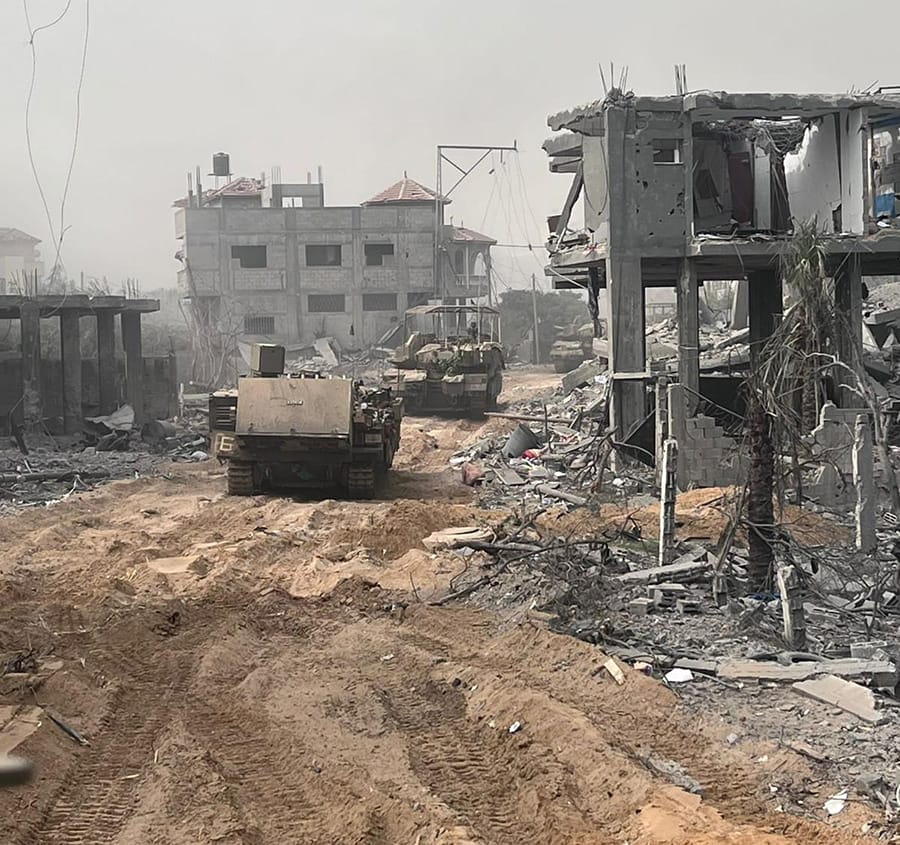
IDF forces during ground operations in the Gaza Strip. 1 November 2023. Wikipedia Commons
By way of a historical comparison, the British war-planners were initially for the more “accurate” arial attacks against German cities and ordered more discriminatory bombings of military targets. But, when the precision proved elusive in the face of Nazi air defences the British Air Force leadership shifted its gear and went all out for the carpet bombing of all targeted cities.
In sharp contrast, from the get-go, Israeli senior officials have made it clear that they had absolutely no moral or humanly qualm about the wholesale physical destruction of entire neighbourhoods complete with hospitals, schools, refugee camps, and other sites in Gaza whose population was overwhelmingly civilians – and women and children at that. “Accuracy” in military operations against the Hamas is not a factor in Israel’s official planning. The number of civilian deaths including thousands of children, babies, pregnant women, the elderly speak louder than Israel’s well-rehearsed media mantra of “reducing civilian death tolls”.
In commenting on the genocides in Israel and Myanmar, a word about my professional and personal background may be in order because I am not a legally trained professional. And I do not concern myself with law, as such, here.
I am a long-time human rights activist with over 35 years of involvement in international human rights activism. Academically, for 6 years (1992-98), I was a doctoral student of the pioneering expert on (Nazi) SS and its leader Himmler, the late Robert L. Koehl, at the University of Wisconsin at Madison. My historian mentor interrogated, in his capacity as a US Army Military Intelligence officer, surrendered junior SS officers in the American section of the defeated Nazi Germany. Upon resuming his studies at Harvard after the war, Koehl wrote his PhD thesis in 1953 on the SS and its Himmler, based on both the archival materials from two of the chambers of the Nuremberg Trials, and personal interactions with former SS officers under his custody.
Both Koehl and I shared a lifelong interest in viewing the mass crimes of murderous organizations through the eyes of the perpetrators. He was a German American, born in Kenosha, Wisconsin, and grew up bilingual, German and English, and I, an ethnically dominant Bama from the nationalist heartlands of Myanmar, with 3-generations of family ties with the instrument of Myanmar genocide, the country’s armed forces.
My primary activism has always been focused on ending the military dictatorship in my native country of Burma – now Myanmar. But I devoted the last 10 years of my activism and research to the study of genocides, when I discovered, through numerous United Nations and NGO reports on Myanmar, that the military there was not simply committing egregious human rights crimes against dissidents and other defiant ethnic minorities but, in fact, committing “a textbook case of genocide” against a tiny minority population of Rohingya in Western Myanmar.
My wife and researcher colleague Dr Natalie Brinham and I conducted the first-ever study (of 3 years) of Myanmar’s persecution of Rohingya using genocide as our conceptual framework.

WATCH: Genocide: Why We Let it Happen | Full Panel Discussion | Oxford Union
Genocide leaves the darkest stain on the conscience of humanity, yet today we are again witnessing international passivity in the face of the genocide in Myanmar.
Additionally, and equally important, as an ethnically dominant Myanmar with deep roots in the genocide-perpetrating Myanmar, the crime of genocide is not “simply” a matter of academic or professional interest. It has become a consuming existential matter. Myanmar genocide calls into serious question my sense of Burmese-ness and my attachment to the land from which I have been exiled. For this heinous crime is committed in my ethnic name.
More broadly, genocide is an affront to all who consider themselves decent humans. With such existential dimension to those of us with conscience, from the population of perpetrators, genocide cannot, and must not be left, in the hands of international lawyers, genocide scholars and ultimately national and international courts.
After all, the UN member states – 153 out of the total of nearly 200 – that pledge to uphold the binding Genocide Convention have typically failed to either prevent genocides or punish perpetrating states throughout the Cold War, and thereafter.
That said, after the Cold War Era lull, the principal judicial organ of the United Nations known as the International Court of Justice (ICJ), and based in The Hague, Netherlands, where states bring their legal disputes, has rediscovered its institutional mission, centrality and role, with respect to what is generally perceived as “the crime of all crimes”, genocide, more recently with Gambia vs. Myanmar.
The court was absent in many a cases of state crimes. Enter Suharto’s genocide of 1965 in Indonesia, many an atrocity crime throughout Latin America and Africa, Khmer Rouge of 1975. That’s a story for another day.
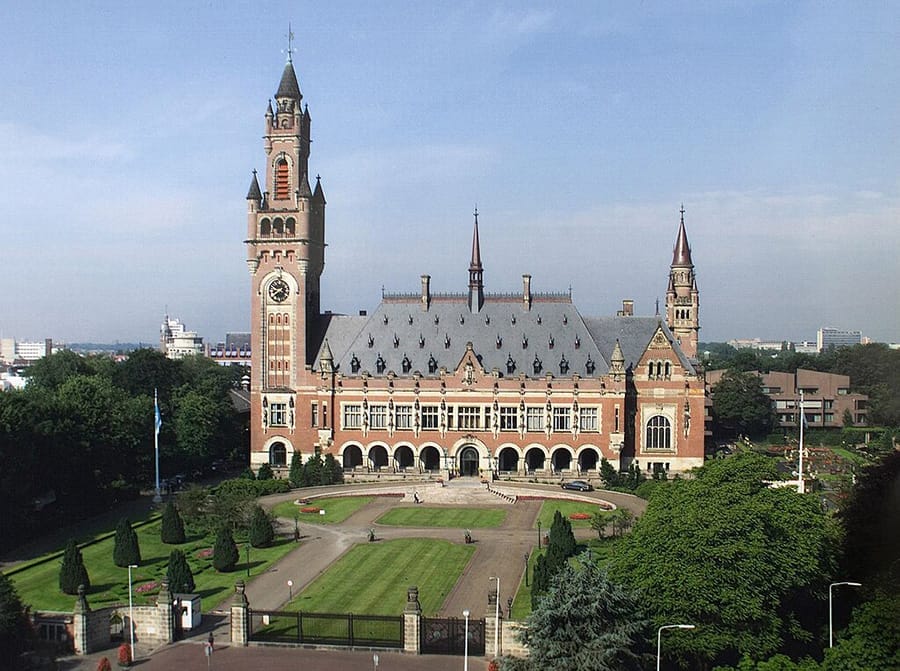
“Absent in many a cases of state crimes”: The Peace Palace in The Hague, Netherlands, which is the seat of the International Court of Justice. Wikipedia Commons
The real consequences of the ICJ genocide cases
While the UN’s Court lacks any instrument to enforce its rulings, failures to comply with the court orders will most certainly exact a heavy reputational and moral price for any offending state.
Unlike the International Criminal Court (and any other special ad hoc international criminal tribunals, involving genocide allegations, for instance, Rwanda or former Yugoslavia), the ICJ does not concern itself with the individual criminal responsibility of military, civilian or political leaders with command responsibilities.
However, the immense and unrepairable damage to international, national and moral standing awaits these leaders who were seen or deemed responsible for policies and practices of the state which the ICJ finds to be in breach of its treaty or convention obligations. Myanmar’s Nobel Peace Laureate and State Counsellor Aung San Suu Kyi, herself in captivity since the coup 3 years ago, is a recent case in point.
With respect to S. Africa’s attempts to institute the legal case against Israel, the proceedings will certainly empower the campaigners worldwide striving to end Israel’s international illegal annexation of all lands which it has occupied since the end of its war with the Arab states in 1967 war.

Logo of the BDS Movement, an organization calling for boycott, divestment, and sanctions to end the Israeli occupation of Palestine. Wikipedia
More concretely, the case will give the Boycott, Divestment and Sanctions (BDS) movement against anything Israel worldwide a greater momentum. Additionally, the public proceedings at the court will keep in the international spotlight not only Israel’s physical destruction of Gaza but also the continuing Occupation of that land that the world know to belong to Palestinians as a people.
Without getting mired in the legalese – for and against the genocide case – the lay public, activists and scholars alike, can still comprehend what genocide is.
Despite ICJ’s crucial differences vis-a-vis the Nuremberg Trials of 1945-46 which sought to establish criminal responsibility of individual senior Nazi leaders including the Air Force Chief Hermann Goring, Martin Bormann and J. Ribbentrop, and Hans Frank, the ICJ case against Israel is most certainly going to have intergenerational consequences, both morally, social psychologically and institutionally for Israel (and its public) in particular, and the Jewish diaspora worldwide in general. For centuries, the old Christian Europe and, more recently, the Nazis of the “Enlightened Europe” have inflicted upon the world’s Jewry an intergenerational trauma while the State of Israel is inflicting a profound sense of shame and disdain amongst “the Jews with conscience” towards Netanyahu’s “One and Only Jewish State”. In their view, and as a matter of fact, the Zionist State has weaponized “Never again!”, mobilized Nazi Genocide Memorial museums (including Auschwitz and the US Holocaust Memorial Museum) and resorted to the Bible to justify its genocidal settler colonialism which rests on the land, displacement, mass deportation and corpses of an uncountable number of Palestinian.
Beyond the future legal arguments and counterarguments at the ICJ, and the already raging debate outside amongst genocide scholars, lawyers and lay public, Israel’s physical destruction, as a matter of state policy, of 2.3 million Palestinians in Gaza will become personal – as it should.
For me, the accompanying genocidal ideologies of which “self-defence” is a commonly shared justificatory narrative amongst perpetrating and collaborating states and society. The language of “self-defence” was present in Hitler’s Mein Kampf (1924), just as it was in my native country’s genocidal narrative against Muslim Rohingyas, a decade ago.
As warped as Hitler was, one of his thematic concerns was the presence of the inferior race of Jude who would contaminate the Aryan nation of racially “superior” Germans. Writing several years before Hitler and the Nazi emerged as a marginal ideological force, Kaiser Wilhem II wrote to one of his generals that the Jews (of Germany) were the “parasites” which grew on the beautiful German oak tree. Apparently, Hitler took it upon himself the national duty of self-defence against the parasite. According to the 2-part BBC Documentary Series, the SS Colonel Eichman told, in reems of recorded interview in Argentina, the Dutch Nazi journalist, Hitler uttered the operative word “physical destruction” of what the Nazis considered the contaminating race of the Jews as the “solution”.
And we know what ensued.
To my deepest disgust, Auschwitz-Birkenau Museum, of all the institutions in the world, officially echoed this Hitlerite “self-defence” narrative in its 20 November statement (which received 15.7 million views) supporting unequivocally Israel’s “right to self-defence.
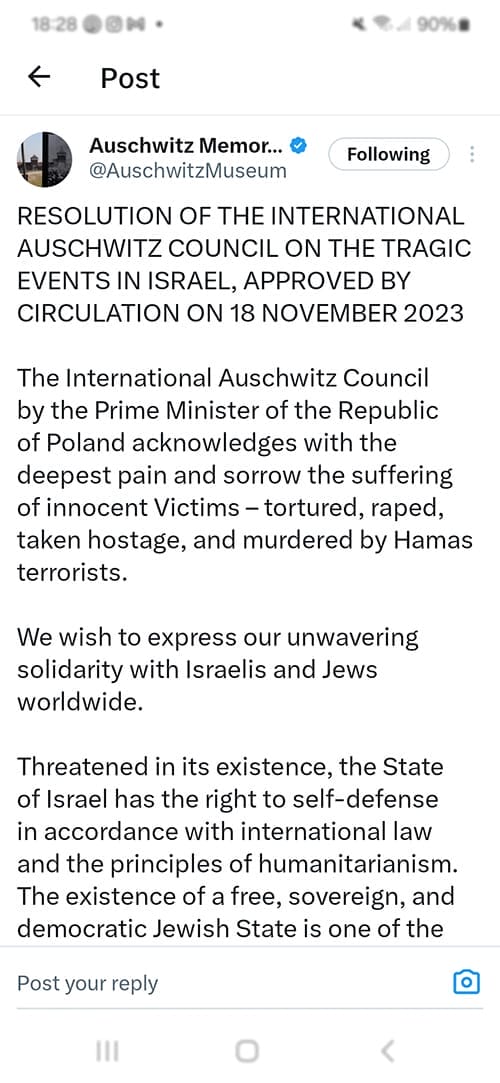

As recent as 3 January, Israel’s Ambassador to the UK, Tzipi Hotovely, had publicly spelled out Hitlerite’s wholesale physical destruction of the unwanted racial population of 2.3 million Palestinians from Gaza, already under total siege subjected to the day and night arial, naval and ground attacks by the Israeli Defence Forces.
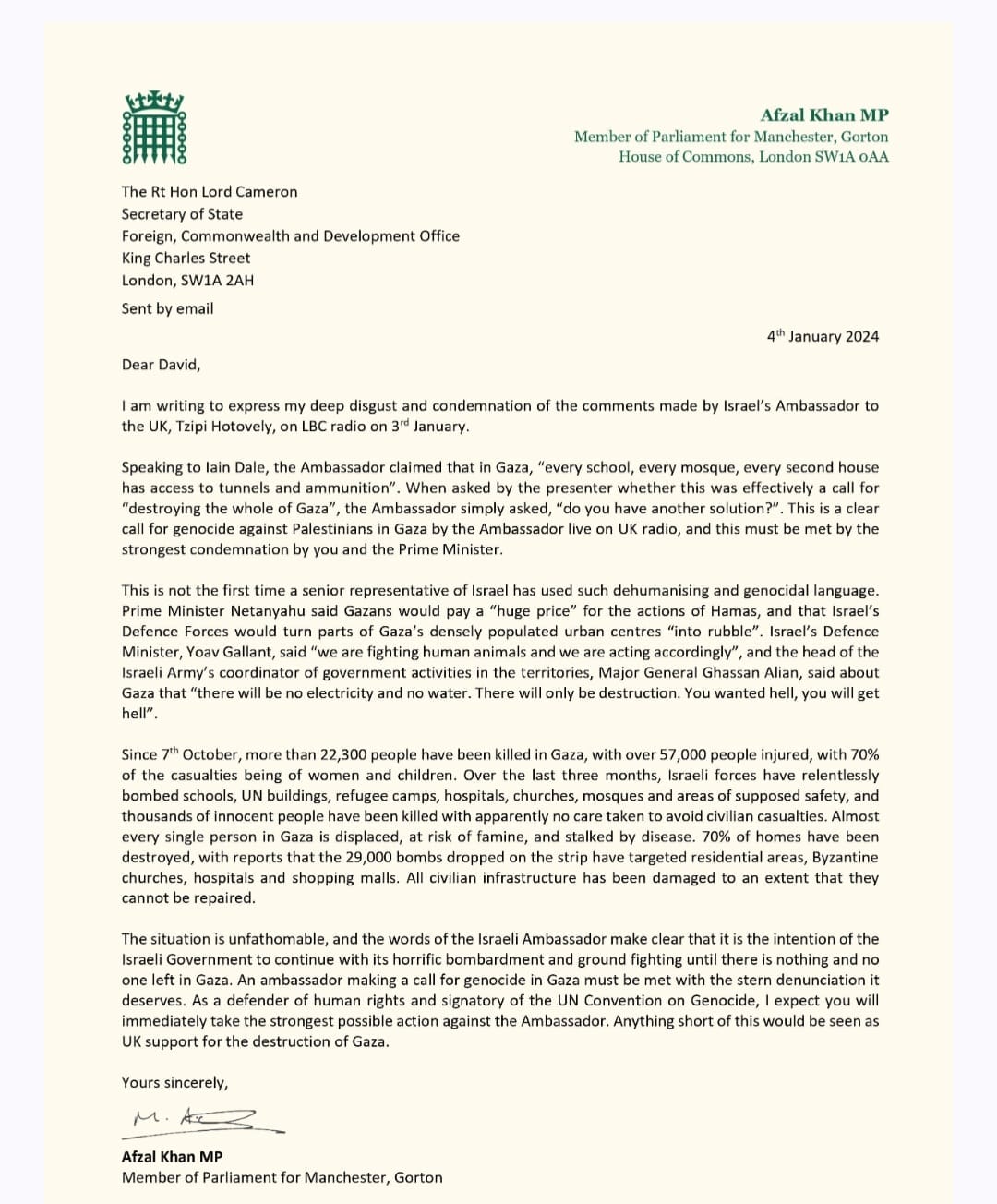
MP Khan’s letter to Davin Cameron dated 4th January, 2024.
In his 4th January-dated letter to David Cameron, UK’s Foreign Secretary, MP for Manchester Afzal Khan wrote, “(s)peaking to Iain Dale (of LBC radio), the Ambassador claimed that in Gaza, “every school, every mosque, every second house, has access to tunnels and munition.” When asked by the presenter whether this was effectively a call for “destroying the whole of Gaza”, the Ambassador simply asked, “do you have another solution?”
No two (genocidal) solutions to the unwanted populations are identical. Not all genocidal racisms and the mono-racialized political states build gas chambers, nor do they copycat the acts of population destruction.
But all genocides in essence seek to destroy a human group or population, marked and unwanted.
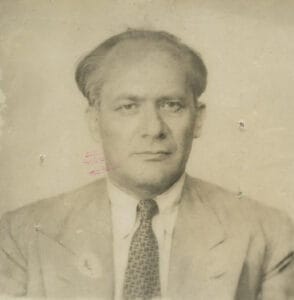
Raphael Lemkin (1900 – 1959) was a Polish lawyer of Jewish descent, known for coining the term genocide and campaigning to establish the Genocide Convention. Wikipedia
Beyond law and courts, and scholarly debates, I will give Raphael Lemkin (1900-1959), the Polish Jewish scholar who studied law at the then Polish city of Lwow (now the Ukrainian city of Lviv, several hours’ drive from the Polish border and Auschwitz) in the early 1920’s and coined the word “genocide” even before the Nazi genocide gathered steam. In his book Axis Rul in Occupied Europe: Laws of Occupation, Analysis of Government, Proposals for Redress (originally published by the Carnegie Endowment for Peace, Division of International Law, 1944; Second Edition by Lawbook Exchange Ltd., 2008), Lemkin wrote:
By “genocide” we mean the destruction of a nation or an ethnic group. … (Genocide) is intended rather to signify a coordinated plan of different actions aiming at the destruction of essential foundations of the life of national groups, with the aim of annihilating the groups themselves. The objectives of such a plan would be disintegration of the political and social institutions, of culture, language, national feelings, religion, and economic existence of national groups, and the destruction of the personal security, liberty, health, dignity, and even the lives of the individuals belonging to such groups. Genocide is directed against the national group as an entity, and the actions involved are directed against individuals, not in their individual capacity, but as members of the national group (p.79).
Here Lemkin proceeded to illustrate his point.
The following illustration will suffice. The confiscation of property of nationals of an occupied area on the ground that they have left the country may be considered simply as a deprivation of their individual property rights. However, if the confiscations are ordered against individuals solely because they are Poles, Jews, or Czechs, then the same confiscations tend in effect to weaken the national entities of which those persons are members (p.79).
In Lemkin’s extremely substantial conception of genocide as a process, “(g)enocide has two phases: one destruction of the national pattern of the oppressed group; the other, the imposition of the national pattern of the oppressor. This imposition, in turn, may be made upon the oppressed population which is allowed to remain, or upon the territory alone, after the removal of the population and the colonization of the area by the oppressor’s own nationals.”
A “textbook genocide” is taking place
In conclusion, those legal scholars and practitioners who oppose Israel’s conduct in Gaza since October 7, 2023 argue that Israel is perpetrating “a textbook genocide” while holding up the legally framed Genocide Convention designed to “legislate” different large scale crimes targeting identity-based groups, racial, ethnic, national or religious. They are not necessarily wrong except that they fall far short of Lemkin’s comprehensive articulation of genocide, which includes even the post-physical destruction of the colonized under the occupation of the oppressor.
Lemkin as the Jewish refugee intellectual who fled the Nazi-occupied Europe and was acutely concerned about the kind of state-organized atrocity crimes (that is, crime against humanity, ethnic cleansing, war crimes and genocide) that the Ottoman Turks committed against the Armenian population amongst them, and that the Nazis were preparing to perpetrate against “racially inferior stocks” to make Lebensraum or “living space” for the Aryan race in East Europe – replace the word “living space” with “settlements” in the Israel Occupied Territories.
Turning his attention to “our own ranks”, Albert Einstein, another Jewish emigre to the United States, saw through the “Fascist” nature of settler colonial state and the “Terrorism” as a means to this end (of building the Jewish homeland in biblical Zion).
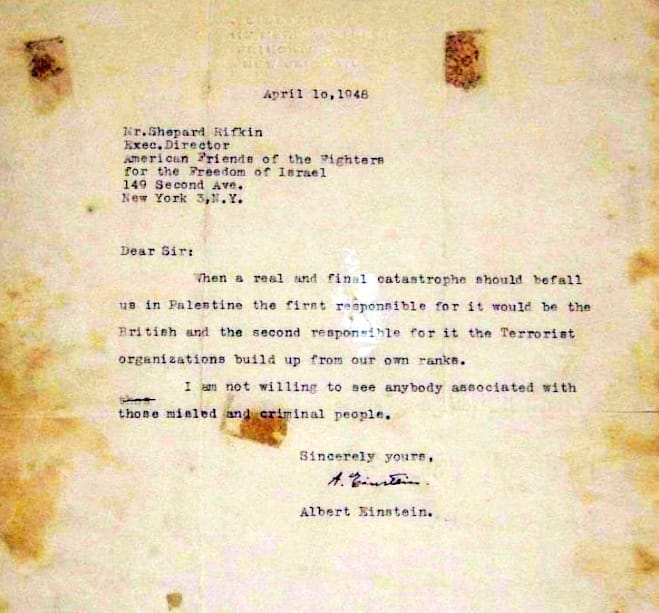
Einstein’s letter written in the same year – 1948 – when Israel was founded. For the more detailed contextual information regarding Einstein’s brief letter, see Albert Einstein Letter to The New York Times. December 4, 1948 New Palestine Party. Visit of Menachen Begin and Aims of Political Movement Discussed: Albert Einstein, Hannah Arendt, Sidney Hook, et.al. : Free Download, Borrow, and Streaming: Internet Archive
Just listen to the talk of post-Gaza “conflict” administration and demographic arrangement of the residents of Gaza (and West Bank) by Israel and the collaborating states and multilateral bodies – the likes of which include USA, UK, Germany, France, Canada, and the European Union.
What an irony that it is the world’s “One and Only Jewish State” that is morphing into Lemkin’s worst nightmare!
Whatever the ICJ’s eventual ruling, the conceptual words of the Jewish legal genius who bestowed upon our world the almost sacrosanct Law against genocide are proving chillingly prophetic.
The silver lining is this, however: there are “Jews with conscience” – thousands of them in the diaspora, for instance, under the banner of the Jewish Voice for Peace – who feel so incensed and violated that Israel is perpetrating, in the name of the Jews and Judeaism, “this crime of all crimes” against the entire population of people whose land the Israeli political state has “confiscated” – or stolen, to put it in plain English – and whose national culture and ethnic identity have been framed as “inferior” or “human animals”. They will most likely support S. Africa’s genocide case against apartheid Israel, help advance Palestinians’ liberation struggle and work in solidarity with campaigners for a Free Palestine.
Maung Zarni
Banner: Palestinians inspect the ruins of Aklouk Tower destroyed in Israeli airstrikes in Gaza City on October 8, 2023. Wikipedia Commons

